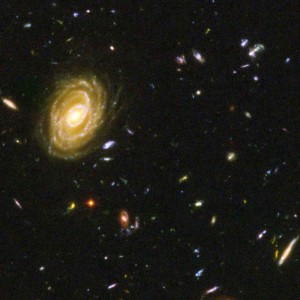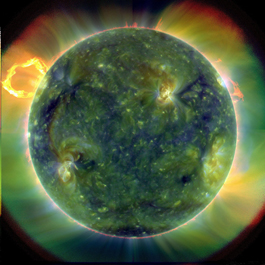
This photograph is of the "Hubble Space Telescope Ultra Deep Field." Light from the most distant galaxies in this image has been traveling towards us for 90% of the age of the Universe, about 13.73 billion years. (Image courtesy of NASA; STSciI)
Speaking topics
The author lectures on a wide range of material related to modern cosmology, astronomy, physics, Kabbalah, and science and religion. His dramatic, illustrated talks combine movies and demonstrations with study, song, and meditation to make these amazing insights accessible to everyone.
For more information, please email (substitute @ for “at”) Lectures at LetThereBeLightBook.com
Kabbalah, Science, and Religious Pluralism
A response to the Harvard Divinity School’s 2008 Paul Tillich Lecture. Click here to read the presentation in its entirety.
From the Big Bang to “In the Beginning”:
Lectures with Text Study
The religious and ethical imperatives of cosmology, and the human seach for meaning: science and religion. Modern astronomy — the “heavens and the Earth and all their host (Gen: 2,1).” Modern physics and the Universe. The Biblical creation, and the multi-layered rabbinic understandings of the first word: Beresheit (“In the Beginning”). Maimonides on the Divine authority for science. Hubble, Einstein, General Relativity, and the Big Bang Universe. A sense of Awe. The Kabbalistic view of the Big Bang; the ethics of Creation. Quantum physics and the pervasive cosmic light of the Creation.
In the Beginning…13.73 Billion Years Ago
What is the Universe? An overview from the smallest scales to the largest. The Biblical creation, and its Kabbalistic interpretation. The three pillars of scientific cosmology: observation, the theory of relativity, and particle physics. The modern picture of where, when, and how the Universe was created. Religious perspectives on human knowledge: are we presumptuous in thinking we know the truth? Kabbalistic and physical concepts of human consciousness and its cosmological implications.
Religion and Science in Harmony
Why science and religion are harmonious – a Jewish perspective. Attitudes towards science in the Bible, and from rabbinic authorities including Maimonides; attitudes towards religion from great scientists including Newton and Darwin. Shared concepts in science and religion, with examples drawn from cosmology and the Kabbalah. The big questions of today — is the universe eternally expanding, is there any significance for humanity, is there life elsewhere in the universe — and some possible answers from science and religious traditions including Kabbalah.
A Religious Perspective on Scientific Cosmology
Why theories of cosmology should matter to us in the first place — rabbinic perspectives on Genesis. The modern scientific picture of the universe and its creation, from the big bang to cosmic acceleration — and how we know. Jewish attitudes towards cosmology: Rashi, Maimonides, Nachmanides, and Isaac Luria and the Kabbalah. Unexplained physical mysteries: dark matter, cosmic acceleration, a Theory of Everything, and quantum decoherence.
Intelligent Life — Views from Astronomy and Kabbalah
Extraterrestrial life in the universe: is there any evidence for it, and if not, what are the chances of ever finding it? How were the 180 known extra-solar planets discovered, what do we know about them, and how they might have formed. Our Earth is perfect for life — it this an accident? Quantum mechanics and human consciousness. Human purpose in the universe: consciousness, kabbalistic healing (“tikkun olam),” and related concepts from the Zohar. What is free-will, and do we have it? Rabbinic attitudes towards free will. Awe (“yirah”) in the Zohar and Kabbalah. Quantum mechanics, the Copenhagen interpretation, and kabbalistic awareness.
Our Wonderful Universe: Intelligently Designed?
Our universe and our Earth are wonderfully suited for life — some examples of this remarkable phenomenon from physics, astronomy, and elsewhere. Does such perfection imply “intelligent design”? The Anthropic Principle and contingent creation. The primary text of Kabbalah, the Zohar, and some perspective on humanity and its role in the cosmos. Modern physics responds to the Anthropic Principle with “many worlds.” The Jewish tradition on “many worlds.”
Modern Cosmology and Kabbalah: A Set of Lectures
(adjustable in number)
- What is the Universe?
Science and religion contemplate the cosmos and its creation. The remarkable truth — today we know with considerable confidence what the universe is like, and how it came into being. Religious perspectives on why should we care about cosmology, and why we can believe the scientific observations and theories that are to follow. The universe and its size — how big is it, really? The contents of the cosmos: 95% mysterious dark matter and dark energy, plus galaxies, stars, and planets. Basic ideas in Kabbalah. The quest for meaning: science and religion as partners in seeking. The path ahead. - The Amazing Nature of our Universe
The universe as created and dynamic, not eternal and unchanging. Curved space, space-time, and other concepts in relativity. The remarkable speed of light. Astronomical tools of the trade. Isaac Luria and the Kabbalah of Safed: mystical concepts of space, time, and the creation. Light, the powerful image of creativity and the Creation. The light of the Creation seen today: the cosmic microwave background radiation. - The Creation of the Universe
The four forces and the elementary particles of our world; how these participated in the birth of the cosmos. “Inflation” and the first minutes in the life of the universe. The creation of the atoms of our world. Kabbalah, and Lurianic cosmogony: the sefirot in an evolving cosmos. “Reaching and not reaching” in the Kabbalah; the release of the cosmic background light. Modern astronomical mysteries, and the latest research results. - Humanity in the Universe
Science and religion contemplate the cosmos and its creation; a more informed consideration. Human consciouness and free-will. Quantum mechanics, measurement, and a mystical analog of awe (“yirah”). The Copenhagen Interpretation of quantum mechanics. Human purpose, and Kabbalistic healing of the world: “tikkun olam.” Extra-terrestrial life in the cosmos. Take-aways: moral lessons from science and cosmology. Some current mysteries, and some reassuring blessings.
